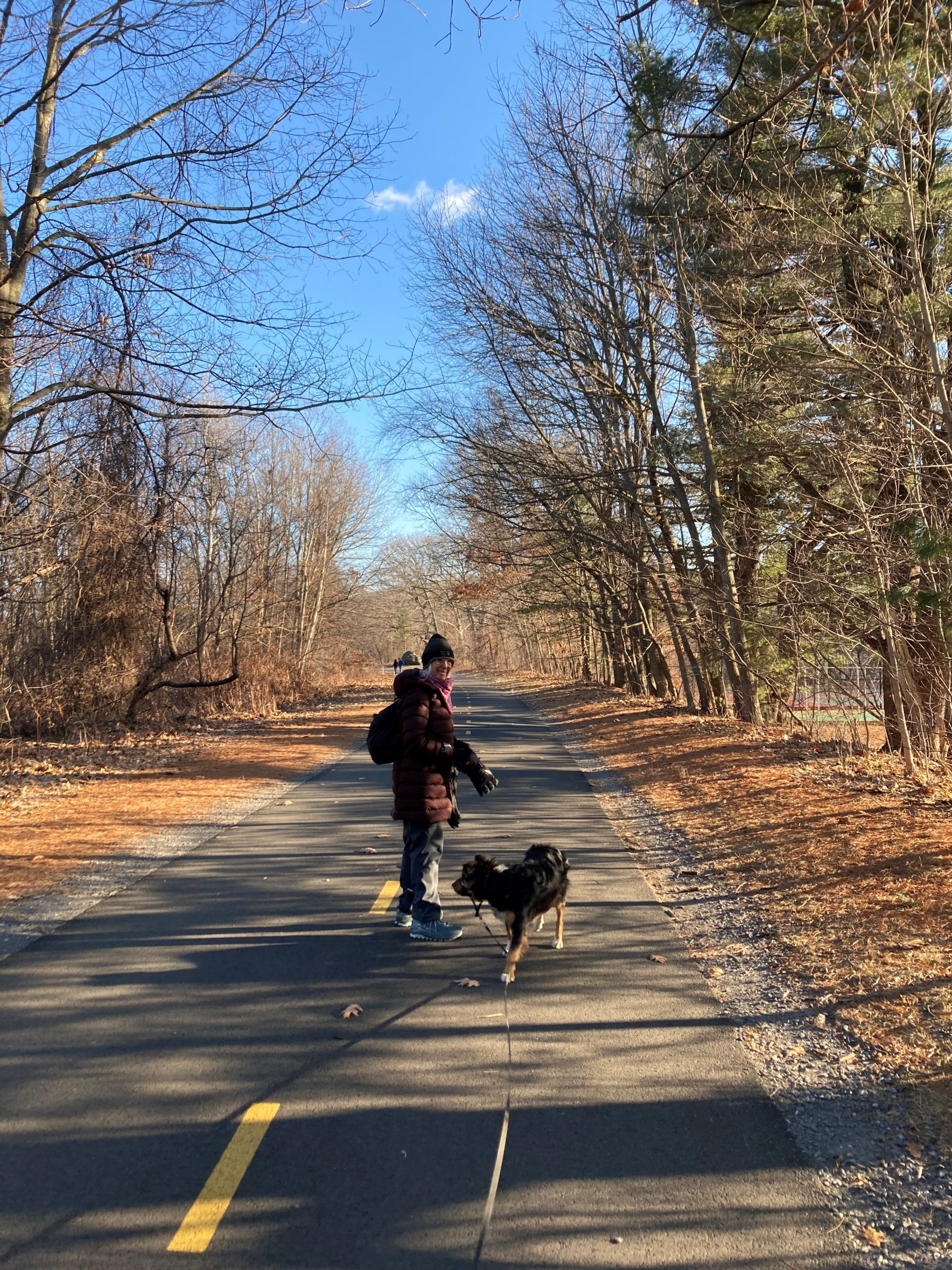Forget not that the earth delights to feel your bare feet and the winds long to play with your hair.
-Khalil Gibran
It’s cold out today, colder than it has been. Without windchill, it’s 27 degrees. With windchill, it’s, well, just damn cold. Phyllis and I are accompanying Waldo on the Reformatory Branch Trail and the Minuteman Bikeway — Christine had a conflict and couldn’t make it. The two paths together make up a route that goes from Concord to Cambridge at the Alewife T-Station near Fresh Pond. The Reformatory Branch is not paved and it runs 3.9 miles from Concord to Bedford. The Bikeway is paved and follows, pretty closely, the path Paul Revere took on his famous ride of 1775. It runs 10.1 miles from Bedford to Cambridge and has been a multipurpose path since 1998. Bicycle commuters use the latter to bike to town from Boston’s outlying suburbs, but there are bikes on the former as well. Today, there aren’t many bikes, but, despite the cold, there are a lot of fellow walkers. After the warmup trek from Concord to Bedford, Phyllis and I are comfortable enough and Waldo, hell, he’s in his element.
After the Battle of Lexington and the subsequent clash with the colonials in Concord, the British retreated through the same woods (although not the same trees) that we walk through today. The trail runs close to Lexington Green, where the “shot heard around the world” was fired, but not so close that we can see it. Although we do walk through forested areas, we can see houses and commercial buildings through winterized denuded foliage along much of our route. The towns and cities of Boston suburbia are very close.
I’m impressed that the Redcoats marched not only along our 14-mile trek, but further, all the way into Boston. And they did it twice, both to Concord and then back. And they did it all on the same day. And they did it while being shot at by the colonial militia. They were some hardy dudes. I can’t help but wonder what both the Redcoats and the colonial militia would think of this place as it is today.
Even more incredible is the realization that all this happened only 8 generations ago. I’m almost 72, so that’s only 3.4 times my lifetime. In those terms, it doesn’t seem so long ago at all. Think about all that has happened in the world during that short period of time. For that matter, I’m awed by all the change that’s occurred during my lifetime, and I remember it. It’s not theoretical history at all. It’s real, solid and palpable, flesh and blood. Hell, I can still smell and taste it. We are living through an ever-accelerating change in the way we live, and it’s happening globally. I can remember living in Ethiopia in the early 1960’s when there was just one short piece of paved road in the country. Everything else was gravel or dirt ruts. Today, the country is connected by modern highways. I have heard that the camel drivers of caravans crossing the Sahara now use cell phones to keep in touch with their families while out trekking through the dunes. Dramatic change is everywhere.
And yet, we, as biological organisms, haven’t changed hardly at all. There hasn’t been enough time for us to evolve from what our ancestors were in 1775. Or even to evolve much from what people were during the Trojan War. That was 100 generations ago and there just hasn’t been enough time to make that much difference between what human beings were then and what they are now. Evolution happens slowly. Very slowly. So here we are, animals whose bodies evolved to live in forests and run on grassy plains, interacting with other animals and plants, also evolved to exist in a natural world, who are thrown into a totally artificial man-made universe that our bodies were never designed to function in. Is it any wonder we’re having trouble?
The thing is, the natural world of our ancestors is still here, just outside our doors, struggling to survive in this new ever-changing world, supporting us as best it can. We may think that we live in large cities filled with electronic and gas-powered doodads that keep us living in relative luxury, but we do not. The truth is, these cities and machines are imbedded in a natural world that envelops us and provides us with the raw materials that we need to survive. All our technology and advancements just changed the caves we live in. We still rely on nature to provide us with the essentials of life – the oxygen we breathe, the water we drink and the biology that supports our biology. Without nature, we are screwed. And we’re destroying that heritage as rapidly as we change the milieu we live in.
But out here on the trail, although it is paved by tar that has been dredged up from underground, and the air we breathe is polluted by industry and cars, we are swathed in a thin blanket of nature where we can be reminded of the real world of our existence.
And it is a beautiful thing.
Just ask Waldo.



